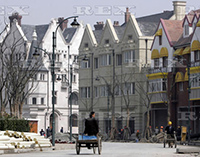Overbuilding in the Chinese property market has left the country with empty homes and entire ‘new cities’ devoid of inhabitants. As the world watches anxiously for signs of a crash, Sophia Furber investigates the possible effect of a Chinese real estate crisis on the UK property market
Economists across the world are nervously watching China’s property market for signs of a possible crash. The country’s residential sector is hugely oversupplied and house builders are highly leveraged.
In a prime example of what a difference 12 months can make, last year was a particularly exuberant one for the Chinese real estate market. Hong Kong-listed developers such as Country Garden, Agile Property and China Overseas Land all smashed their residential sales targets before the year-end. And in March, news came through that an obscure Chinese property developer had spent $2m (£1.2m) on a pair of Tibetan mastiff puppies – a coveted breed of dog.
But then everything changed. A combination of oversupply, souring investor sentiment, falling prices and dangerous levels of debt suggest that the party could well be over in the Chinese property market – and developers are already starting to feel the hangover.
But what do these problems in an industry 5,000 miles away mean for property professionals in the UK?
Apart from the fact that, as the world’s second-largest economy, a downturn in China could put the global economic recovery at risk, there is a possible direct impact on investment in UK real estate. Chinese buyers invested upward of £3.5bn in the UK property market in 2013, according to London agency WA Ellis.
Here are five key questions that every UK property professional should be aware of concerning a possible real estate crash in China.
1 Why are we talking about this now?
The Chinese economy as a whole got off to a weak start in 2014. GDP growth slowed to 7.4% in Q1, down from 7.7% in the last quarter of 2013 – marking an 18-month low. Although there was some cause for cheer in June, when China’s PMI (which tracks manufacturing activity) was forecast to rise to 51 points, its highest level for the year, there are fears that a cooling property market could jeopardise the country’s entire economy – after all, it makes up 17% of the country’s GDP. By comparison, real estate made up 13% of US GDP at the height of the property boom in 2007.
Housing data for the past two months shows that the market is slowing. According to the China Real Estate Index System, new home prices in China fell by 0.5% in June, following a 0.3% decline ?in May.
This causes a major challenge for the way most Chinese house builders run their businesses. They tend to take on high levels of debt, then rely on rapid pre-sales of homes to pay it back. But if developers are not getting the cash flow from sales – as is increasingly the case in China – then the model breaks down.
Pan Shiyi, chief executive of Soho China Estates, one of the country’s largest listed real estate companies, said in May that the heavily-indebted Chinese house building market was “like the Titanic heading for an iceberg”.
2 Who are the culprits For taking out high levels of debt – and who is lending to them?
Although there have been a handful of defaults by large, listed developers, the real problem lies with small and medium-sized developers.
Banks have started to retrench lending for all but the biggest property companies, but the country’s US$3.5trn-$5trn (£2trn-£2.9trn) shadow banking system has willingly stepped in to fill the gap. While Europe is crying out for greater involvement by non-bank financiers in property lending, in China, institutions, trusts and funds account for a huge slice of property lending. These loans tend to be expensive, but borrowers have been tolerant of high interest rates because of expectations of rapid property sales, according to a recent report by CBRE China on the country’s shadow banks.
3 Is it just the housing market that is the problem?
No. There is also trouble in parts of the commercial property sector. Respondents to the Urban Land Institute’s Mainland China Cities Report, published last week, have complained that developers in second-tier cities have been “over-zealous” in building office blocks, many of which now stand empty.
While the retail property market is flourishing in major cities such as Shanghai, Guangzhou and Beijing, ?thanks to the consumer spending habits of the ?growing middle class, the picture in other parts of the country is bleak.
The world’s largest mall, ?the South China Mall in Dongguan, is a salutary ?lesson on the dangers of building too much in the wrong places. The 7m sq ft shopping centre opened in 2005, but most of its 2,350 units are vacant.
4What would happen if the market implodes?
A property crash in China could drag down the country’s economic growth – and would be likely to contribute to a global economic slowdown. The impact could be felt as far away as the UK, where it could deal a blow to the recovering occupier market.
If parts of China’s shadow banking system were to fall into a property-led implosion, it is unlikely that the Chinese government would allow it to fail. Many alternative lenders are owned by the state anyway.
“It is important to remember that China is not a market economy,” says Joel Rothstein, partner at the Beijing and Los Angeles offices of law firm Paul Hastings. “This isn’t like the UK or the US – the state does have the power to step in and bail out shadow lenders.”
5 What would be the impact on the UK?
Even if the Chinese property bubble were to ?burst, it is likely that there would be little negative ?impact on flows of capital ?into the UK property market.
Ken Wong, chief operating officer of Related Companies, said during a panel debate at the British Property Federation’s recent annual conference that trouble in China would “not turn off the spigot of capital flows into London, but would narrow them considerably”.
Paul Hastings’ Rothstein says there is even a possibility that inbound investment in ?the UK, especially into the residential sector, could increase as a result of China’s property woes because it ?would present better opportunities than a dysfunctional Chinese market.
sophia.furber@estatesgazette.com
• See also – Investors: invitation to Britain











